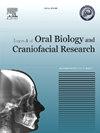Long-term effects of orthognathic surgery on masticatory function in individuals with cleft lip and palate: A prospective study
Q1 Medicine
Journal of oral biology and craniofacial research
Pub Date : 2025-01-01
DOI:10.1016/j.jobcr.2024.11.002
引用次数: 0
Abstract
Objective
To prospectively evaluate the long-term effects of orthognathic surgery on masticatory function in individuals with repaired complete cleft lip and palate and to compare the results with a control group.
Material and methods
A total of 40 individuals were prospectively analyzed before (PRE-ORTHOG) and approximately 12 months after orthognathic surgery (POST-ORTHOG). The participants were divided into two groups: 1) Cleft Lip and Palate Group (CLP): 20 adults with CLP undergoing orthognathic surgery (14 ♂, 6 ♀, age 24 ± 3 years), and 2) Control Group (CON): 20 paired adults with Angle Class I skeletal pattern who had never undergone orthognathic surgery (14 ♂, 6 ♀, age 25 ± 5 years). Three variables were evaluated: 1) Bite Force (BF) (measured in Newtons – N) presented as the average of the bite force from the right and left molars ( RM + LM), using a gnathodynamometer (IDDK Kratos), 2) Masticatory Efficiency (ME) (ranging from 0 to 1, with values closer to 1 indicating poorer efficiency), assessed through a dual-color masticatory gum test analyzed visually and optoelectronically (ViewGum©), and 3) Masticatory Capacity (MC): patient-reported ability to chew, rated on a two-point scale (P/R = poor to reasonable, G/O = good to optimal).
Results
In the PRE-ORTHOG phase, the BF for the CLP group ( RM + LM = 285 ± 141) was significantly lower compared to the CON group ( RM + LM = 524 ± 202). In the POST-ORTHOG phase, the CLP group ( RM + LM = 373 ± 129) showed significant improvements in BF in relation to the PRE-ORTHOG phase, with values similar to those of the CON group. Masticatory efficiency improved significantly in the POST-ORTHOG phase (0.222 ± 0.071) compared to PRE-ORTHOG (0.470 ± 0.126) in the CLP group, while PRE-ORTHOG values were worse than those of the CON group (0.148 ± 0.050). Furthermore, 45 % of CLP participants reported P/R MC before surgery, while none reported this after surgery, a statistically significant improvement. The POST-ORTHOG MC results for CLP participants were comparable to the CON group, with 100 % reporting G/O MC after surgery.
Conclusions
Overall, the group with CLP demonstrated impaired masticatory function in the preoperative phase compared to the control group across all variables analyzed. Orthognathic surgery improves masticatory function in patients with CLP, with postoperative parameters comparable to those of the control group.

正颌手术对唇腭裂患者咀嚼功能的长期影响:一项前瞻性研究。
目的:前瞻性评价正颌手术对完全性唇腭裂修复患者咀嚼功能的远期影响,并与对照组进行比较。材料和方法:共40例患者在正颌手术前(PRE-ORTHOG)和大约12个月后(POST-ORTHOG)进行前瞻性分析。参与者被分为两组:1)唇腭裂组(CLP): 20例接受正颌手术的唇腭裂成人(14♂,6♀,年龄24±3岁);2)对照组(CON): 20例从未接受过正颌手术的角类骨骼模式成人(14♂,6♀,年龄25±5岁)。评估了三个变量:1)咬合力(BF)(以牛顿- N为单位)表示为左右臼齿(x - RM + LM)的咬合力的平均值,使用牙颌测力计(IDDK Kratos), 2)咀嚼效率(ME)(范围从0到1,接近1的值表示效率较差),通过双色咀嚼胶测试进行评估视觉和光电分析(ViewGum©),和3)咀嚼容量(MC):患者报告的咀嚼能力,以两分制评分(P/R =差到合理,G/O =好到最佳)。结果:在PRE-ORTHOG阶段,CLP组(x - RM + LM = 285±141)的BF明显低于CON组(x - RM + LM = 524±202)。在POST-ORTHOG阶段,CLP组(x - RM + LM = 373±129)与PRE-ORTHOG阶段相比,BF有明显的改善,其值与CON组相似。CLP组咀嚼效率较CON组(0.148±0.050)显著提高(0.222±0.071),而CLP组咀嚼效率较CON组(0.470±0.126)明显降低(0.222±0.071)。此外,45%的CLP参与者在手术前报告了P/R MC,而在手术后没有报告,统计学上有显著改善。CLP参与者的POST-ORTHOG MC结果与CON组相当,术后100%报告G/O MC。结论:总的来说,在所有变量分析中,与对照组相比,CLP组在术前阶段表现出咀嚼功能受损。正颌手术改善了CLP患者的咀嚼功能,其术后参数与对照组相当。
本文章由计算机程序翻译,如有差异,请以英文原文为准。
求助全文
约1分钟内获得全文
求助全文
来源期刊

Journal of oral biology and craniofacial research
Medicine-Otorhinolaryngology
CiteScore
4.90
自引率
0.00%
发文量
133
审稿时长
167 days
期刊介绍:
Journal of Oral Biology and Craniofacial Research (JOBCR)is the official journal of the Craniofacial Research Foundation (CRF). The journal aims to provide a common platform for both clinical and translational research and to promote interdisciplinary sciences in craniofacial region. JOBCR publishes content that includes diseases, injuries and defects in the head, neck, face, jaws and the hard and soft tissues of the mouth and jaws and face region; diagnosis and medical management of diseases specific to the orofacial tissues and of oral manifestations of systemic diseases; studies on identifying populations at risk of oral disease or in need of specific care, and comparing regional, environmental, social, and access similarities and differences in dental care between populations; diseases of the mouth and related structures like salivary glands, temporomandibular joints, facial muscles and perioral skin; biomedical engineering, tissue engineering and stem cells. The journal publishes reviews, commentaries, peer-reviewed original research articles, short communication, and case reports.
 求助内容:
求助内容: 应助结果提醒方式:
应助结果提醒方式:


